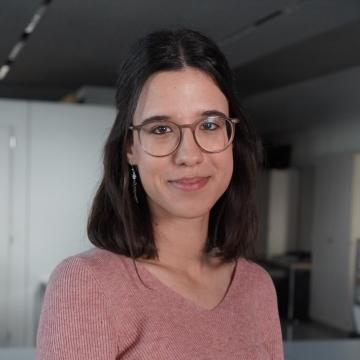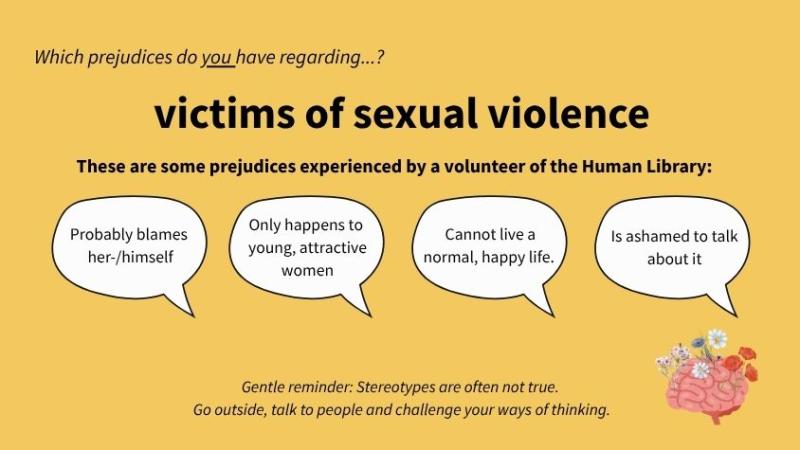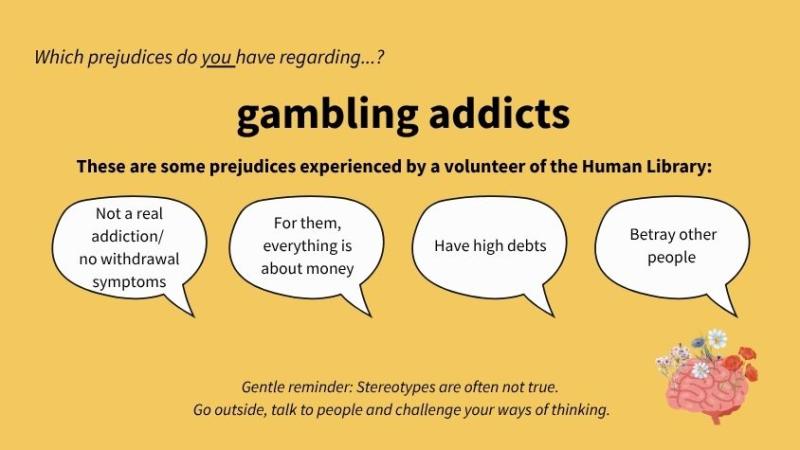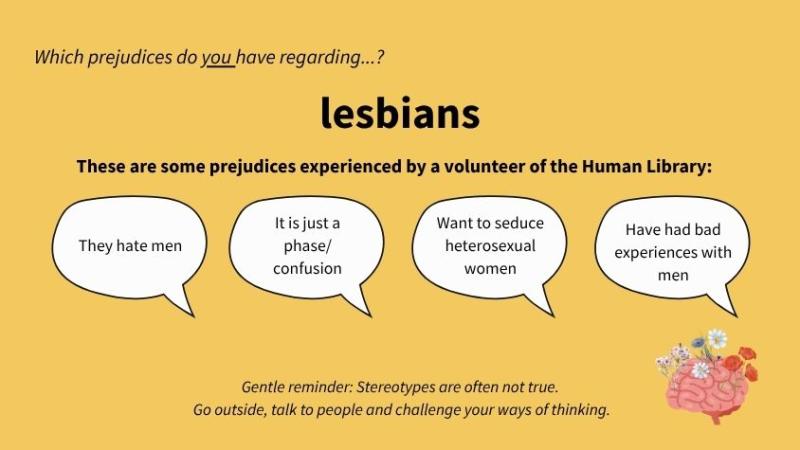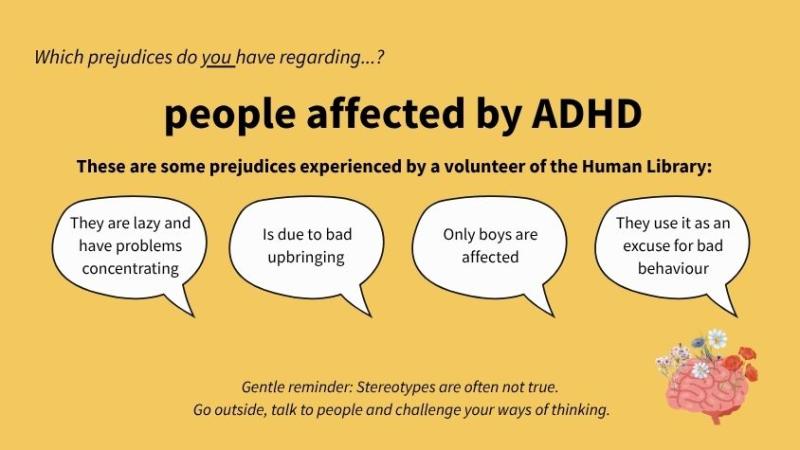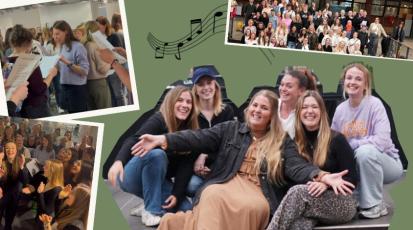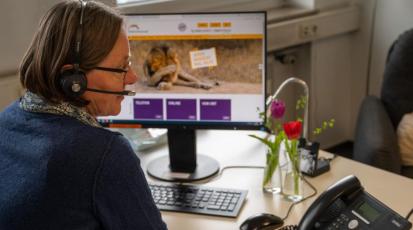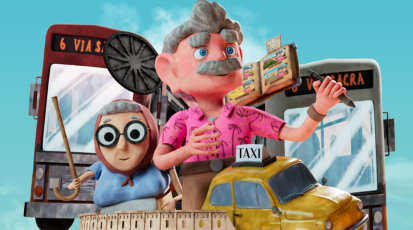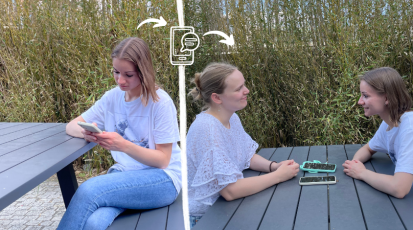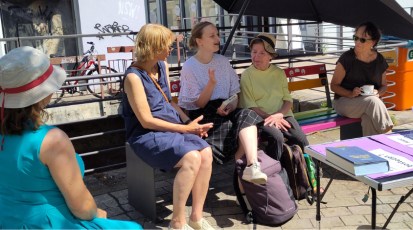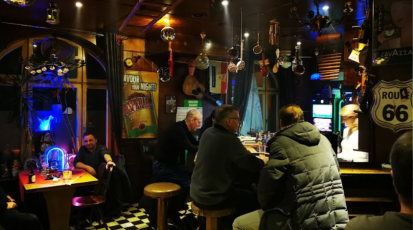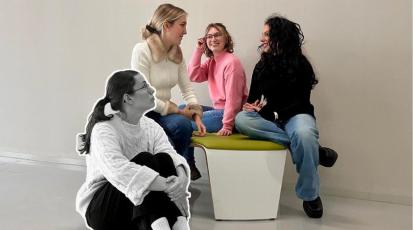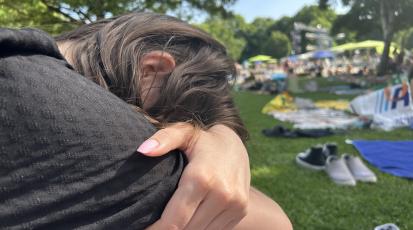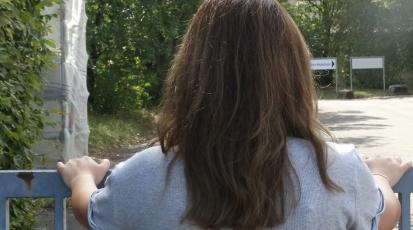“A single conversation will not break down all prejudices, but it can be a first impulse that leads to more openness, self-reflection and long-term attitude change.”
The Human Library – strangers sharing stories
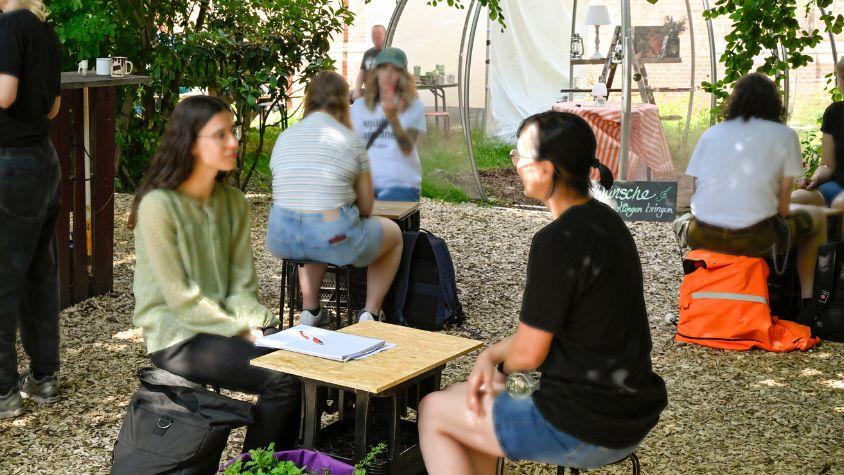
Content warning for readers:
This article may contain topics that could be perceived as sensitive, including violence, mental health, discrimination and prejudice. Please be aware of this and read the article according to your personal sensitivity. Our intention is to report respectfully and sensitively to preserve the dignity of the individuals concerned.
„Speak in the library, please”, a human-sized display encourages passengers walking by. However, a library is nowhere to be seen. Instead, the sign introduces a small area covered in gras and bark mulch behind a church in Hamburg. Here, a diverse group of people has gathered to exchange personal stories, ask questions, to listen and learn.
This gathering in mid-June was organized by the Human Library, a international non-profit organization from Denmark that hosts events since the year 2000 in over 85 countries. These civil society events are for free. Other services, such as the support that the organization offers to companies regarding their inclusion agendas, are commercial.
The idea of the Human Library is based on the concept of a regular library where visitors can borrow books. Except, this library consists of “human books” that volunteer to share their personal stories with strangers and answer their questions. The volunteers represent minority or marginalized communities that experience prejudice, stigmatization or discrimination due to their lifestyle, disabilities, social status, ethnic origins or other factors. The conversations between the human books and the “readers” are designed to challenge stigma and stereotypes.
The connection between loneliness and public stigma
Lia Gaida, a research assistant at the Hamburg University of Applied Sciences, is currently working on a pilot project on loneliness prevention and connectedness. She explains that prejudice and stigmatization can contribute to other societal issues such as loneliness. This can happen “either through our own social isolation or through exclusion by other people.”
As an extern expert, she is optimistic that the concept of the Human Library could be one of many solutions: “This approach breaks through barriers and holds great potential to strengthen the bond between people. Both parties can feel more seen, heard and understood. The volunteers are actively included in society in a public setting and can share their story in a self-determined way. In doing so, they can feel a sense of empowerment. The visitors learn to break down prejudices and can feel a sense of connection afterwards.”
Choose a book, read a story, unjudge someone
Today in Hamburg, the human books and the readers sit in pairs at small tables made of reversed plastic-boxes with wooden panels laying top. One person of each pair is wearing a black or white t-shirt imprinted with slogans such as unjudge someone.
At the Human Library, readers have access to books on different topics – depending on the experiences of the volunteers that are present at the events. Today, a big pinboard at the entrance divides the books into two categories: available and borrowed. Books that are borrowed are currently talking to a reader, books that are available can be requested for a conversation. Today, visitors can choose between 15 different topics such as anxiety and eating disorders, sexual violence, bipolar disorder or homelessness. Next to the pinboard, they can find a booklet that lists typical prejudices for each topic to help them kickstart conversations.
One of today’s volunteers is Fridjof, a 33-year-old man. Due to privacy reasons, he and the other volunteers mentioned in this text will only be introduced with their first names. Fridjof shares the story of his gambling addiction because he wants to spread awareness about the topic and help people affected to feel less alone: “In comparison to other addictions – for example concerning alcohol or other drugs – gambling addictions are seldomly talked about in schools or in media. That must change.”
Due to the lack of awareness among society, gambling addicts are confronted with stereotypes: “People often assume that gamblers try to escape reality and don’t want to be active members of society. For many of us, that is not true. I didn’t gamble to avoid my job or my responsibilities – I gambled so I could continue functioning in real life. It was a coping mechanism.”
While his addiction worsened, Fridjof became more and more successful in his career in order to finance his gambling. It took him a long time to ask for help, but eventually hiding his problems became almost impossible. After a long period of therapy and successful recovery, he now openly talks about his story at the Human Library. Fridjof responds to questions from the visitors with no noticeable shame, hesitation or nervousness. In the contrary, he seems to be at peace with himself and his past: “My experiences turned me into the man I am today”, he says. “Therefore, if I could turn back time, I would not change a thing.”
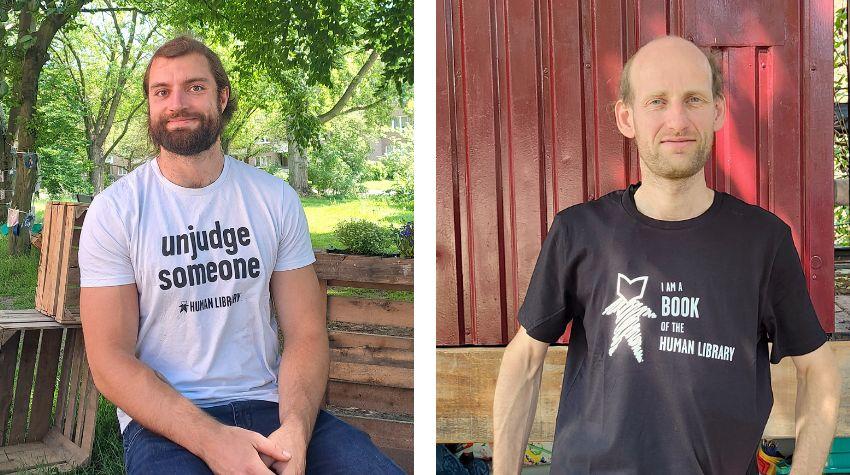
The conversations between books and readers are limited to 30 minutes. That is long enough for the experience to have a real impact, says Lia Gaida. “Brief encounters can definitely have lasting effects, especially if they are emotionally significant. A single conversation will not break down all prejudices, but it can be a first impulse that leads to more openness, self-reflection and long-term attitude change. Participation at these events can also increase motivation to engage more with other people in the future.”
In 2023, Gary Yu Hin Lam, Hei Ting Wong and Mengge Zhang published a systematic narrative review focusing on the Human Library. Despite stating that more “diverse rigorous research methodologies” on this topic are necessary, they summarize existing literature as follows (p.1): “Reduced prejudices and improved attitudes were reported in readers, while both readers and books reported various facets of personal growth.”
Darina is a volunteer at the Human Library in Hamburg since the first event two years ago. As a book, she shares her experiences on different topics such as sexual violence and queerness. Through volunteering, she has experienced how impactful these conversations can be. One event a year ago was especially memorable for her: A young woman came to talk to her about sexual violence. “During our conversation, I felt really emotional and I noticed that she had many unanswered questions. I wanted to offer further support, so I gave her my contact details.” The woman reached out to thank her shortly after the event. “We exchanged a few messages, but then I did not hear from her for a while. A few weeks ago, I was told that she would also be here today. Not as a visitor, but as a human book talking about veganism.”
Auch interessant
Limits and challenges of this approach
Talking about sensitive topics and sharing personal stories with strangers does not come without risks: Darina’s experiences as a volunteer have been mostly positive. However, once or twice she had to interrupt or end a conversation due to insensitive questions or visitors overstepping boundaries. “I am happy to share my story, but I do not want to feel like I am the object of voyeurism”, she says.
Lia Gaida views this aspect as one main challenge for the Human Library: “The volunteers expose themselves emotionally and could be confronted with stressful or inappropriate questions”, she explains. “The expectations of the visitors can be problematic if they consume the other person rather than really engaging in a conversation. Therefore, the work of the volunteers requires careful preparation, support and aftercare.”
Shirley Hartlage and Katharina Bloemberg organized the event in Hamburg and carefully prepared the volunteers for this experience: “It is very important to us that the volunteers feel comfortable and safe”, says Shirley Hartlage. “During the preparation, we make sure that they are mentally stable enough to talk openly about the topics and are prepared for difficult questions. Sometimes we also act out conversations in advance. Of course, the volunteers can also end conversations or ask us for help at any time during events.”
For more stories on loneliness and connection from an international perspective, please follow this link!
The Human Library is planning to expand to further cities in the future. Gaida has one concern left regarding the range of visitors: “People with strongly entrenched prejudices are less likely to voluntarily take advantage of offers such as the Human Library. Nevertheless, in the right setting, e.g. in schools, universities or in a company context, the format can also reach people who otherwise have little contact with diversity. Care should be taken to ensure that the encounter is low-threshold and easily accessible.”
In Hamburg, the event continues from midday until the evening. Some visitors leave after borrowing one book, others stay for multiple stories. The sun shines through the canopy of leaves, the wind makes a string of colourful little flags sway between the trees. One of volunteers states: “An atmosphere as beautiful and peaceful as this can hardly be found anywhere else in reality.”
In the midth of the big city, people decide to slow down. Some visitors wait for thirty minutes to borrow a book, some even longer. No hectic, no loud noises. Instead, honest face-to-face conversations and raw human connection between strangers. An experience that could be described as an antidote to loneliness.
If you are struggling with loneliness yourself, there are various services where you can get help at any time. In Germany, for instance, you can find a list of support centres via the ‘Kompetenznetz Einsamkeit’ website. An international offer is ‘Find A Helpline’, a tool that connects people in over 130 countries with certified counselling services that can be searched by topic – including loneliness.

